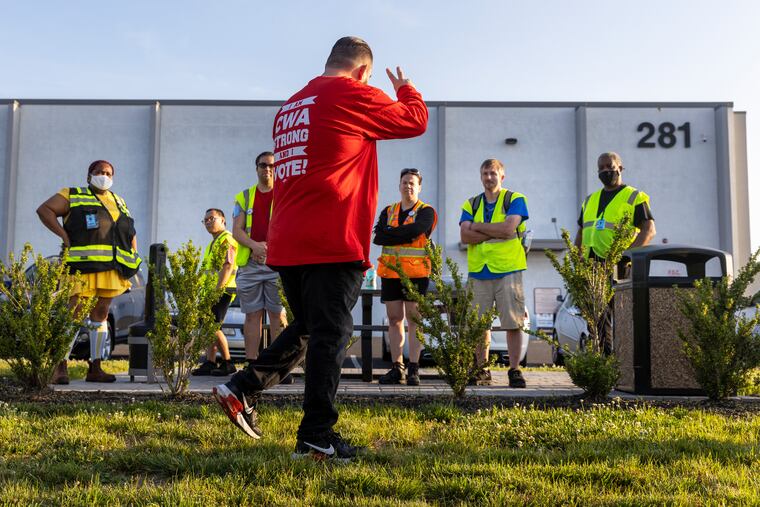Amazon workers demand changes ahead of their warehouse’s closure: ‘I want to be treated like a person’
Longer commutes and an earlier start time led workers to walk out

Vinny Carroll, 54, has been an associate at what’s dubbed as a “last-mile” Amazon warehouse in Bellmawr for more than two years. He and his almost 100 colleagues sort and load packages onto vans. Employees describe the process as a form of logistical magic, albeit grueling.
Carroll said he can have a number of assignments, from picking packages from conveyor belts to placing them on shelves. The assignments are mapped out to reach peak productivity.
“There are some things that are more physical than others and they prefer us not to do them both two days in a row, and wherever you’re usually good at is where they like to place you because everything has to get done within a certain amount of time,” Carroll said.
With Amazon’s track record as a logistical maven, employees at the warehouse in Camden County say they had no reason to doubt the company’s assurances that it would transfer most workers to a nearby warehouse in West Deptford when the Bellmawr facility closes June 28. But Wednesday, 10 employees walked out to protest what they described as a broken promise.
Though small, the protest by the non-union workers is the latest example of labor activism at an Amazon facility, from efforts to unionize warehouses in New York and Alabama to a protest last month by about 100 workers in Minnesota who walked out to demand time off for Eid, the Muslim holiday.
Employees in Bellmawr recently learned that only about 30 workers would be transferred to West Deptford while 50 would be sent to Swedesboro and the rest would be spread across three other locations. Some commutes are expected to near an hour, according to employees.
What’s more, everyone’s starting time is being moved to 1:20 a.m. (from 2:40 a.m.) and employees such as Brenda Stringer, 50, are seeing their days change, as well.
“My schedule has been Tuesday to Friday since I’ve been here and now they’re gonna move me out there and change my schedule from Tuesday to Saturday,” Stringer said. “I take care of the homeless people with my church on Saturdays.”
The Bellmawr closure comes as Amazon, which has more than 50 warehouses in the Philly region, has reevaluated its warehouse footprint after reporting excess fulfillment capacity.
In a statement, however, Amazon framed the closure of the warehouse and the transfers to five other facilities as ways of improving the worker experience.
“These facilities provide upgraded amenities, including increased on-site parking, larger operational spaces, and better break rooms with open market vending,” Amazon spokesperson Maria Boschetti said. The company did not say why fewer people would be transferred to West Deptford than originally expected.
» READ MORE: Amazon now encircles the Philadelphia region with over 50 warehouses
Wednesday’s protest had a healthy showing of union support, with locals from the Communications Workers of America and Teamsters holding signs and cheering along with members of Make the Road New Jersey and Democratic Socialists of America when trucks honked past.
Workers demanded the option to transfer to the West Deptford warehouse, to keep their scheduled days, and an hourly $1 raise for the expense of transferring farther away.
Still, the nervous energy was palpable, with only a few protesters wanting to speak to reporters.
“We’re willing to take those consequences because we’re mistreated anyway,” said Bill Allen, 62. “If you do nothing, you’re gonna face the consequences; you do something, you’re gonna face consequences.”
One change Allen and others say worsened working conditions took place more than a year ago.
Instead of six- or eight-hour shifts throughout the evening, the warehouse adopted 10-hour shifts. In Bellmawr the clock-in was at 2:40 a.m.; in other locations it’s 1:20 a.m.
“A lot of people left because they couldn’t do it,” said Paul Blundell, 37. “Of those of us who stayed, I don’t know if I know anybody here who’s getting enough sleep.”
Employees such as Blundell worry that an already physically taxing job and an unusual schedule could become more dangerous as people need to leave earlier to get to work, without enough time to recover.
“We’re being worked really hard and we’re being worked at crazy hours,” Blundell said. “That’s how the magic happens.”
According to a report published by a coalition of four labor unions, Amazon employed 33% of the country’s warehouse workers but accounted for almost half of the industry’s injuries in 2021.
» READ MORE: Pa.’s Amazon workers have almost twice as many serious injuries as other warehouse workers here
Workers say they don’t want to just leave after investing years in the organization. And they say their demands are about more than Amazon — they’re about how major corporations have pushed their essential workers throughout the pandemic.
Outside of the Bellmawr warehouse, Carroll, a soft-spoken man, put his foot down while wearing his neon yellow Amazon vest, decorated with company pins that celebrate Pride month, autism awareness, and working the peak holiday season.
“I want to be treated like a person, as someone that has a family, that has a home, that has a life,” he said. “This is the second time now they’re asking us to just upend everything for them and if you don’t, just move along, thank you for your service.”